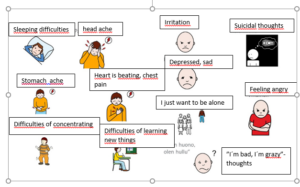2.1 Stress and crises
What is a stress and what does it mean?
-
The stress is used about situation where a lot of pressure and new demands and challenges are targeted to the person
-
It is usually related to the situation where there are difficulties for the person to adjust and cope with overload situation
Reasons for the feeling of stress:
-
For asylum seekers: unstable situation at home country
-
Persecution among people
-
An unsafe trip from home country to a new country
-
Uncertainty about the asylum decision and residence permit
-
Adjustment to the new culture, language and country.
How people usually react in stressful situation:
-
It feels like your thoughts are circulating among difficult issues.
-
It feels bad,
-
There might be physical symptoms too, as a headache, backache, and stomachache ets.).
The symptoms are reactions to our mental and physical existence and our attempt to avoid and manage the difficult situation.
Crises as a reason for the stress:
-
Everyone meets difficult situation sometimes in life. This means that everyday life will change (f.ex. death of our loved one, serious accident, unstable situation as war, adjustment to a new culture and language).
-
These kind of situations are called crises.
-
Crises are a normal and usual reaction to unusual and overloaded situation
-
In order to survive from the crises there is a need to adjust to new life situation
Surviving from crises:
-
There are different stages in surviving the crises (See the table below).
-
Human being will proceed from stage to stage in his/her own individual time and way.
-
The crises will cause stress to the person´s life.
-
Sometimes there might be many factors causing the stress. Surviving from the crises are effected by the other factors.
The stages of crises:
The stage of shockThe meaning:
|
What happens to the person:
|
The stage of reactionThe meaning:
|
What happens to the person:
|
The stage of processingThe meaning:
|
What happens:
|
The stage of new directionThe meaning:
|
What happens:
|
The symptoms of stress and crises can be very scary. It may relieve the pain if we know what is going on. The symptoms can be for example:
The symptoms related to your thoughts:
-
anxiousness
-
difficulties of concentrating
-
difficulties of learning anything new regardless you try hard to learn
-
Willingness to be alone. No strength to be with other people
-
Thoughts may go circling. Difficulties of letting painful thoughts to go
-
Bad dreams, difficult thoughts during the night and sleep, difficulties of getting asleep
-
Difficulties of remembering things which are related to the painful incident
-
Thoughts as becoming “crazy”, and being a “bad person”
The symptoms related to your feelings:
-
being sad or depressed
-
being hopelessness
-
being irritated
-
being angry and annoyed
-
willingness to die or harm yourself
Physical symptoms during the crises:
-
stomachache
-
feeling bad
-
heart is beating
-
pain in the chest
-
headache and sleeping difficulties
If any of those symptoms are strong or last a long period, seek help from the nurse or a doctor.
How to recognize the stress?
Assignment 2:
Look the following pictures. Can you find some symptoms familiar to yourself?
Source: Picture: The symptoms of stress (Kuvat: Papunetin kuvapankki, papunet.net, Sergio Palao / ARASAAC, Elina Vanninen)
Material progressed
Material progressed
